鲁教版(五四制)九年级全册Unit 9 It's important to have good habits. Section A 3a~4c课件(共35张PPT)
文档属性
| 名称 | 鲁教版(五四制)九年级全册Unit 9 It's important to have good habits. Section A 3a~4c课件(共35张PPT) |
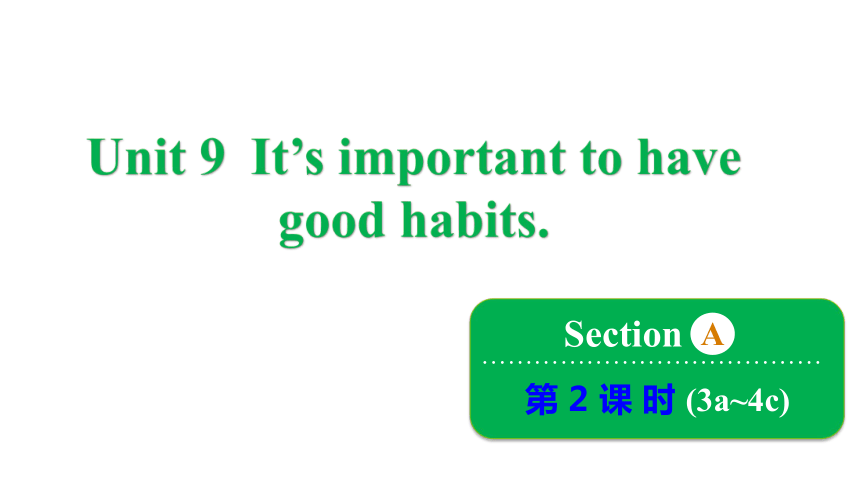
|
|
| 格式 | pptx | ||
| 文件大小 | 742.1KB | ||
| 资源类型 | 教案 | ||
| 版本资源 | 鲁教版 | ||
| 科目 | 英语 | ||
| 更新时间 | 2024-05-03 00:14:32 | ||
图片预览

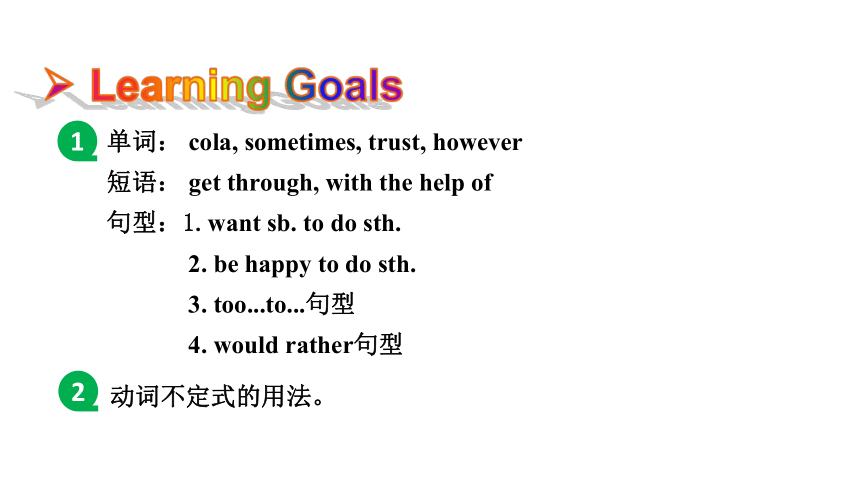
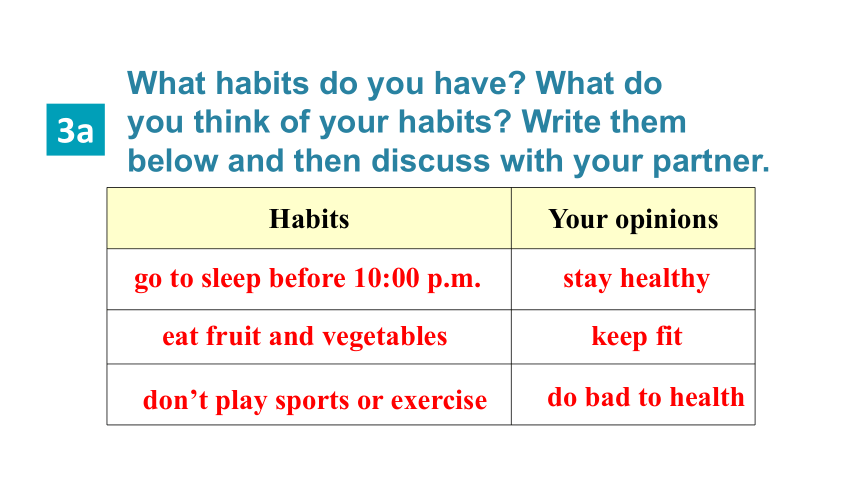
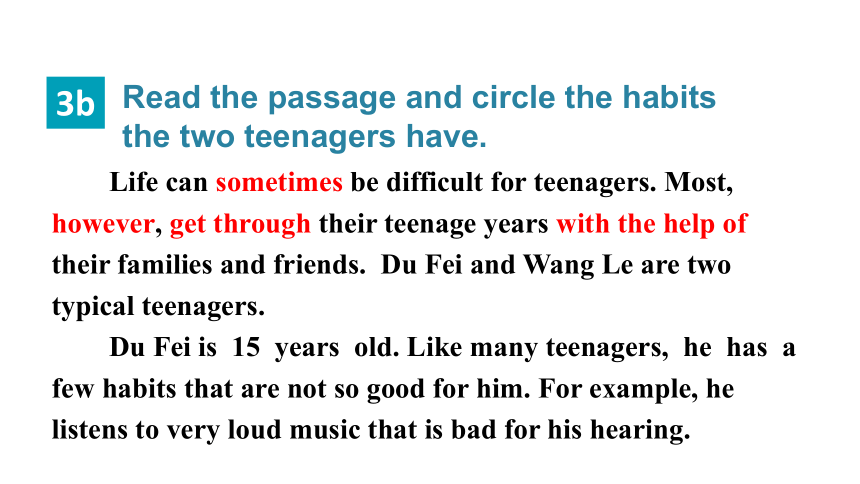
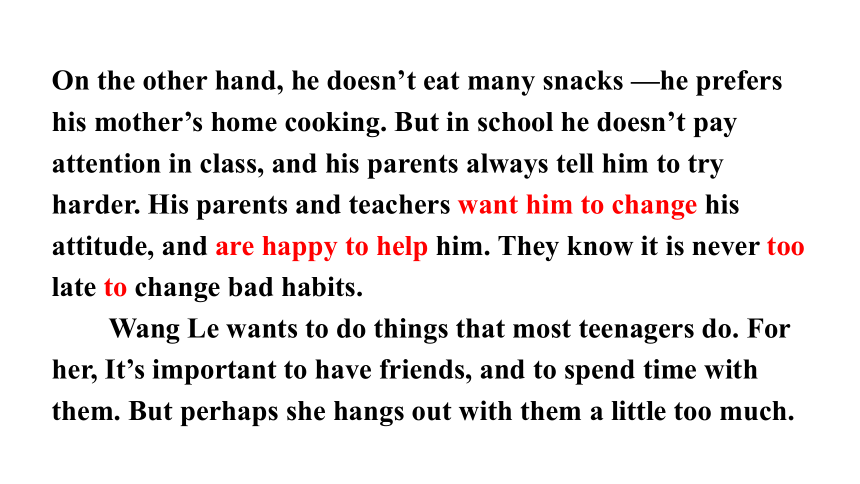
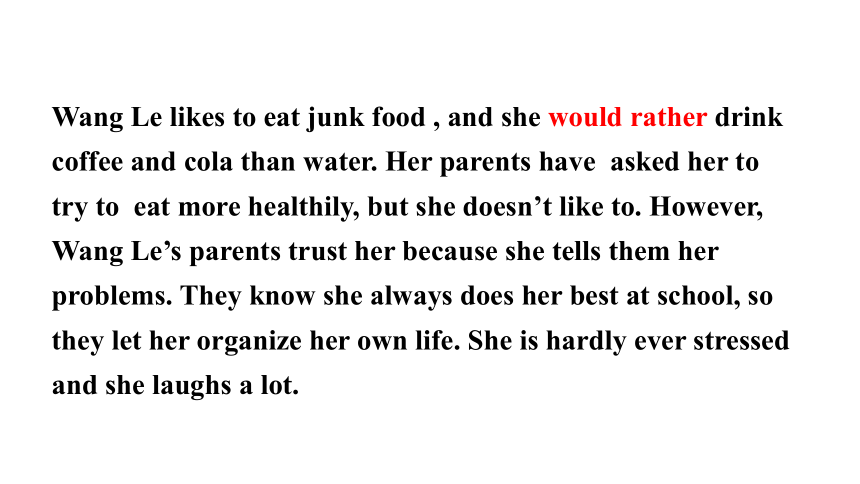
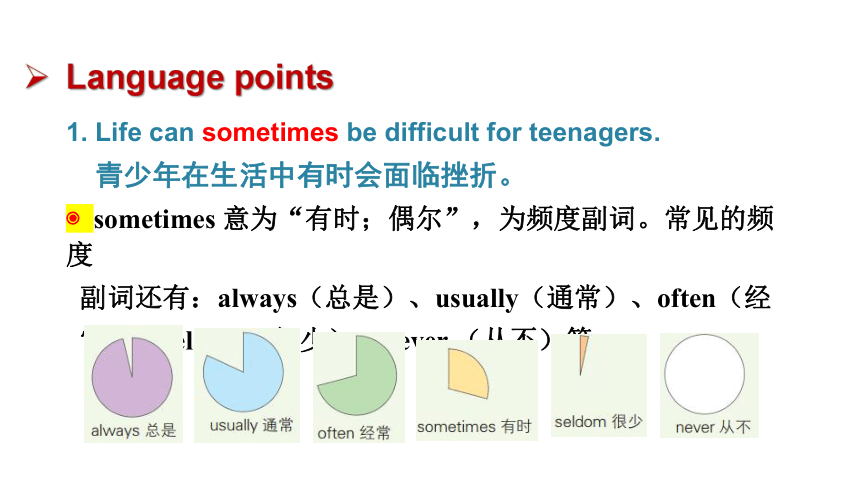
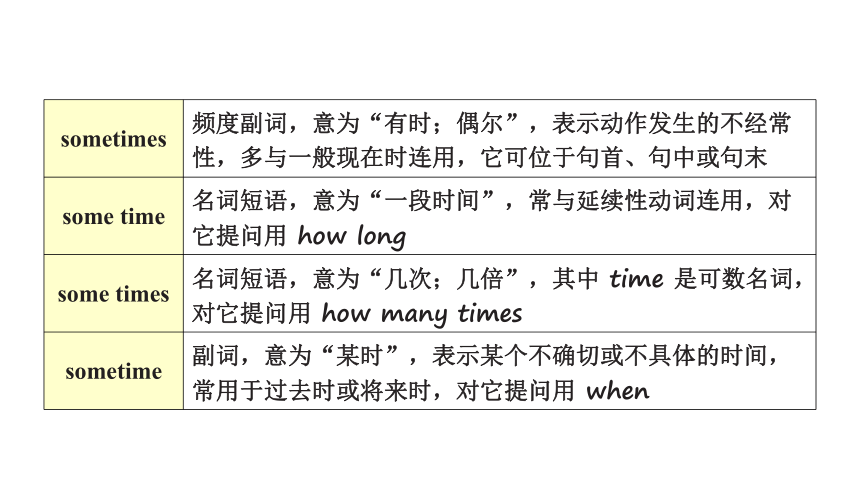
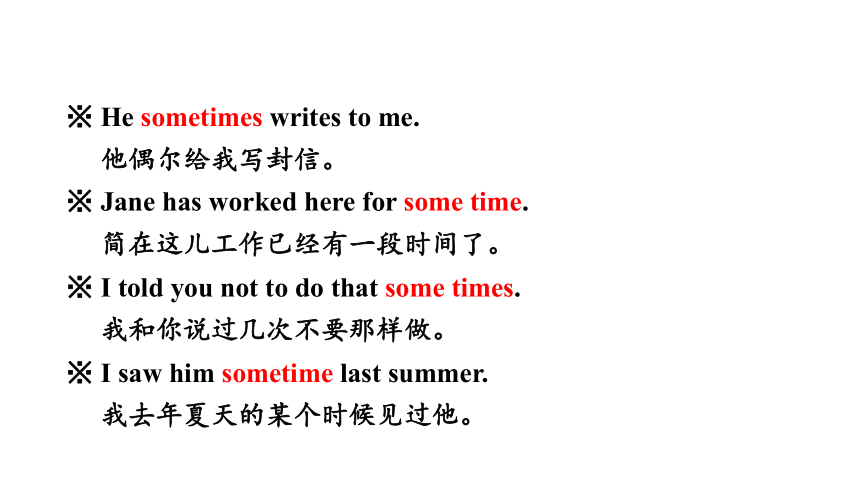
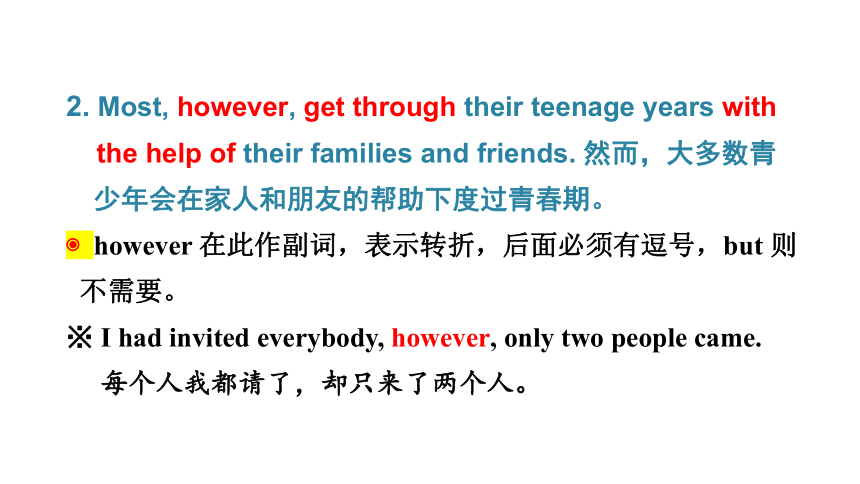
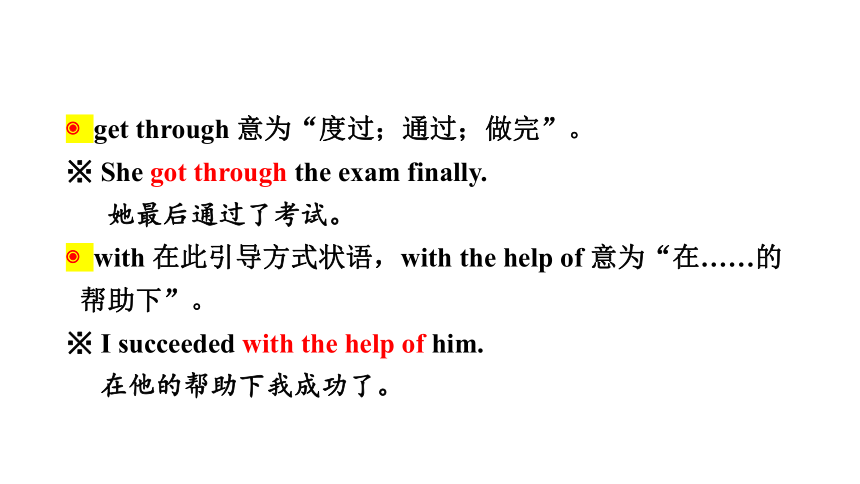
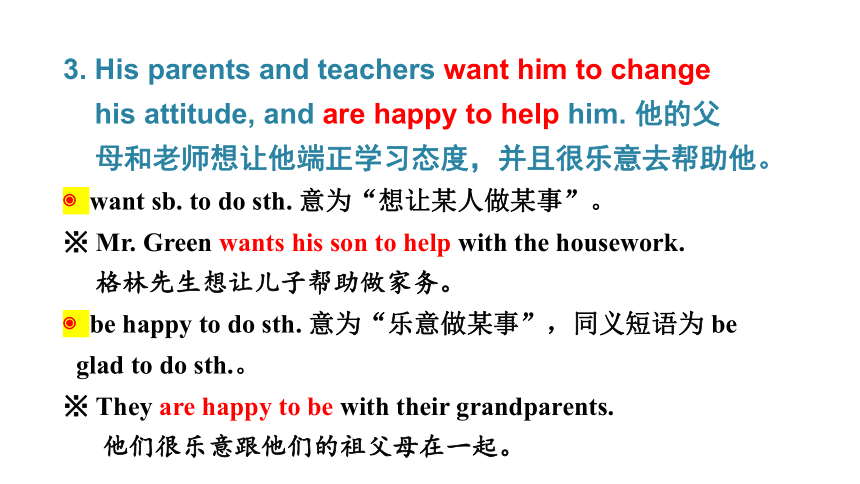
文档简介
(共35张PPT)
Section
Unit 9 It’s important to have good habits.
第 2 课 时 (3a~4c)
…………………………………
A
单词: cola, sometimes, trust, however
短语: get through, with the help of
句型:1.want sb. to do sth.
2. be happy to do sth.
3. too...to...句型
4. would rather句型
Learning Goals
动词不定式的用法。
1
2
What habits do you have What do
you think of your habits Write them below and then discuss with your partner.
3a
Habits Your opinions
go to sleep before 10:00 p.m.
stay healthy
eat fruit and vegetables
keep fit
don’t play sports or exercise
do bad to health
Read the passage and circle the habits the two teenagers have.
3b
Life can sometimes be difficult for teenagers. Most, however, get through their teenage years with the help of their families and friends. Du Fei and Wang Le are two typical teenagers.
Du Fei is 15 years old. Like many teenagers, he has a few habits that are not so good for him. For example, he listens to very loud music that is bad for his hearing.
On the other hand, he doesn’t eat many snacks —he prefers his mother’s home cooking. But in school he doesn’t pay attention in class, and his parents always tell him to try harder. His parents and teachers want him to change his attitude, and are happy to help him. They know it is never too late to change bad habits.
Wang Le wants to do things that most teenagers do. For her, It’s important to have friends, and to spend time with them. But perhaps she hangs out with them a little too much.
Wang Le likes to eat junk food , and she would rather drink coffee and cola than water. Her parents have asked her to try to eat more healthily, but she doesn’t like to. However, Wang Le’s parents trust her because she tells them her problems. They know she always does her best at school, so they let her organize her own life. She is hardly ever stressed and she laughs a lot.
Language points
1. Life can sometimes be difficult for teenagers.
青少年在生活中有时会面临挫折。
sometimes 意为“有时;偶尔”,为频度副词。常见的频度
副词还有:always(总是)、usually(通常)、often(经
常)、seldom(很少)、never (从不)等。
sometimes 频度副词,意为“有时;偶尔”,表示动作发生的不经常性,多与一般现在时连用,它可位于句首、句中或句末
some time 名词短语,意为“一段时间”,常与延续性动词连用,对它提问用 how long
some times 名词短语,意为“几次;几倍”,其中 time 是可数名词,对它提问用 how many times
sometime 副词,意为“某时”,表示某个不确切或不具体的时间,常用于过去时或将来时,对它提问用 when
※ He sometimes writes to me.
他偶尔给我写封信。
※ Jane has worked here for some time.
简在这儿工作已经有一段时间了。
※ I told you not to do that some times.
我和你说过几次不要那样做。
※ I saw him sometime last summer.
我去年夏天的某个时候见过他。
2. Most, however, get through their teenage years with
the help of their families and friends. 然而,大多数青
少年会在家人和朋友的帮助下度过青春期。
however 在此作副词,表示转折,后面必须有逗号,but 则
不需要。
※ I had invited everybody, however, only two people came.
每个人我都请了,却只来了两个人。
get through 意为“度过;通过;做完”。
※ She got through the exam finally.
她最后通过了考试。
with 在此引导方式状语,with the help of 意为“在……的
帮助下”。
※ I succeeded with the help of him.
在他的帮助下我成功了。
3. His parents and teachers want him to change
his attitude, and are happy to help him. 他的父
母和老师想让他端正学习态度,并且很乐意去帮助他。
want sb. to do sth. 意为“想让某人做某事”。
※ Mr. Green wants his son to help with the housework.
格林先生想让儿子帮助做家务。
be happy to do sth. 意为“乐意做某事”,同义短语为 be
glad to do sth.。
※ They are happy to be with their grandparents.
他们很乐意跟他们的祖父母在一起。
4. They know it is never too late to change bad habits.
他们知道改变坏习惯从来都不晚。
too...to...”意为“太……而不能……”,表示否定意义,当 too
前面加 never、not 等否定词时,不表示否定意义,而是加强
语气。
※ The text is too difficult for me to understand.
这篇文章太难了,我理解不了。
※ One is never too old to learn. 活到老,学到老。
5. Wang Le likes to eat junk food, and she would
rather drink coffee and cola than water. 王乐喜欢吃
垃圾食品,并且与水相比,她更喜欢喝咖啡、可乐。
would rather 意为“更喜欢,宁愿”,后跟动词原形,表示主观上的
选择。would rather 无人称变化,其否定形式是在 rather 后加 not,
疑问形式是将would 提到主语前面。 would rather do sth. 意为“宁愿
做某事”,如果表示“与做某事比起来更愿意做某事”,则用 would
rather do sth. than do sth.,该句中 than 后省略了 drink。
※Most teenagers would rather spend time with friends than stay at home.
大多数青少年与待在家相比更喜欢和朋友们共度时光。
6. However, Wang Le’s parents trust her because she
tells them her problems. 然而,王乐的父母相信她,
因为她会把自己的问题告诉父母。
trust 在此作动词,意为“相信;信任”。
trust 后接某人,指相信某人的能力
believe 后接某人,指相信某人所说的话
believe in 指信任某人的品质或某真理等
※ I trusted my child to do it all by himself.
我放手让孩子自己去干。
※ I don’t believe you!我不相信你的话!
※ She doesn’t believe in him. 她不信任他。
※ I believe what you said, but I don’t believe in you.
我相信你说的话,但我不信任你这个人。
Read again and fill in the chart.
Then give suggestions in groups.
3c
Names Good habits Bad habits
Du Fei
Wang Le
doesn’t eat many snacks;
prefers his mother’s home cooking
listens to very loud music;
Doesn’t pay attention in class
spends time with her friends;
always does her best at school;
is hardly ever stressed and laughs a lot
hangs out with her friends a little too much; eats junk food;
would rather drink coffee and cola than water; doesn’t like to eat more healthily
A: I think in order to be healthier, Du Fei needs to...
B: Yes, and he should...
C: He can also...
A: I think in order to be healthier, Du Fei needs to stop
listening to very loud music.
B: Yes, and he should pay attention in class.
C: He can also work harder.
Grammar Focus
It’s important to talk problems over with someone.
It’s important not to play computer games too much.
In order to be healthy, teenagers need to get enough sleep.
She is too young to make her own decisions.
Tell them not to meet strangers.
(1)动词不定式:to+动词原形
不定式的否定式:在不定式符号 to 之前加 not。
Grammer points
1. 动词不定式的构成
动词不定式没有人称和数的变化。它保留着动词的特点,可以有自己的宾语和状语。它具有名词、形容词和副词三大特征,在句中可以作主语、宾语、宾语补足语、表语、定语和状语。
(2)不定式的时态和语态变化:
时态 主动语态 被动语态
一般时 to do to be done
进行时 to be doing
完成时 to have done to have been done
(1) 作主语
※ To keep our environment clean and tidy is our duty.
保持环境的清洁是我们的职责。
(2) 作宾语
※ He wants to be a scientist when he grows up.
长大后他想当一名科学家。
(3) 作宾语补足语
※ Jim asked me to help him with his English.
吉姆要我帮助他学英语。
2. 动词不定式的用法
(4) 作表语
※ My work is to clean the room every day.
我的工作是每天打扫这间屋子。
(5) 作定语
※ Have you got anything to do tomorrow evening?明天晚上你有事吗?
※ He was the first to come to the classroom.
他是第一个来到教室的人。
注意 不定式作定语时,需放在被修饰词之后,作后置定语。
(6) 作状语
※ I come to see you. 我过来看你。(表目的)
※ The apples are hard to reach. 那些苹果很难够到。(表结果)
(1) 有些动词后面的不定式要省去 to。 这样的动词可归纳为:
一感(feel),二听(hear、listen to),三让(let、make、
have),四看(see、watch、look at、notice)。
注意:当它们用于被动结构时,to 必须保留(let 除外)。
※ The teacher made them go out of the classroom.
→They were made to go out of the classroom by the teacher.
老师让他们离开教室。
(2) 动词 help 后面接不定式作宾语补足语,to 可有可无。
※ Will you please help me (to)find my pen?
请帮我找找我的钢笔,好吗?
3. 动词不定式的省略
(3) 在 but、except 等表示“除了……”之意的介词前,若有动词
do 的某种形式,介词后作宾语的不定式常省略 to。
※ He does everything except go to school. 他怎么也不去上学。
so as to 意为“为了”,表目的;“too...to...”意为“太……而不能……”,表结果。
※ Please be quiet so as not to wake the baby.
请安静,别吵醒了小宝宝。
※ He is too excited to speak.
他太激动了,都说不出话来了。
4. 动词的特殊句型
Fill in the blanks with the words in the box.
to exercise not to give not to make
to have to go swimming to make
4a
1. It’s too cold for people _______________ in winter.
2. The purpose of new technology is to make life
easier, ____________ it more difficult.
to go swimming
not to make
3. It’s necessary for the old ______________every day.
4. _________his grandparents happy, Tom visits
them every week.
5. Teenagers want _________some time for themselves
on weekends.
6. You can always ask your boss ____________you too
much pressure.
to exercise
not to give
to have
To make
Write sentences using the words given.
4b
e.g. eat junk food / it / important / kids
__________________________________________________
1. necessary / exercise more / the teenagers / it
___________________________________________________
2. decide / the boy / such loud music / listen
___________________________________________________
It’s important for kids not to eat junk food.
It’s necessary for the teenagers to exercise more.
The boy decided not to listen to such loud music.
3. him / the good news / tell / remember
___________________________________________________
4. Jane’s friend / lose weight / every morning / run
___________________________________________________
5. a little kid / not easy / the math problem / it / work out
___________________________________________________
Remember to tell him the good news.
To lose weight, Jane’s friend runs every morning.
It is not easy for a little kid to work out the math problem.
What do you often do after school Do you think those activities are important Make a conversation according to the example.
· watch TV
· play sports
· study hard
· get enough sleep
· ...
4c
A: Do you think it’s important to
watch TV?
B: Yes, I think we can learn a lot on TV.
C: But too much TV...
A: Do you think it’s important to play sports
B: Yes. I think we can keep healthy by playing
sports.
C: But too much sport can also make you tired.
1. If you want to make friends with someone,you must t_____him first.
2. Mr. Wang is a kind gentleman and has the t_______ Chinese character.
3. Peter p_______ home cooking to fast food. That is,he likes home made
food better.
4. As we are growing up,we should learn to _________ (安排) our own life.
5. If you want to change bad habits,you must first change your ________
(态度).
rust
ypical
refers
orgnaize
attitude
Ⅰ.根据句意和首字母或汉语提示填写单词
Practice
1. ________ (make) the boy happy,he did all kinds of things.
2. My father would rather ______ (walk) to work than______ (drive).
3. It’s important to stay _______ and eat _______ .(health)
4. I don’t think _______ (be) angry with yourself can solve your
problems.
5. My aunt tries her best _______ (make) me_______ (feel) at home
each time I got to her house.
walk
drive
To make
healthy
Ⅱ.用括号内所给单词的适当形式填空
healthily
being
to make
feel
Section
Unit 9 It’s important to have good habits.
第 2 课 时 (3a~4c)
…………………………………
A
单词: cola, sometimes, trust, however
短语: get through, with the help of
句型:1.want sb. to do sth.
2. be happy to do sth.
3. too...to...句型
4. would rather句型
Learning Goals
动词不定式的用法。
1
2
What habits do you have What do
you think of your habits Write them below and then discuss with your partner.
3a
Habits Your opinions
go to sleep before 10:00 p.m.
stay healthy
eat fruit and vegetables
keep fit
don’t play sports or exercise
do bad to health
Read the passage and circle the habits the two teenagers have.
3b
Life can sometimes be difficult for teenagers. Most, however, get through their teenage years with the help of their families and friends. Du Fei and Wang Le are two typical teenagers.
Du Fei is 15 years old. Like many teenagers, he has a few habits that are not so good for him. For example, he listens to very loud music that is bad for his hearing.
On the other hand, he doesn’t eat many snacks —he prefers his mother’s home cooking. But in school he doesn’t pay attention in class, and his parents always tell him to try harder. His parents and teachers want him to change his attitude, and are happy to help him. They know it is never too late to change bad habits.
Wang Le wants to do things that most teenagers do. For her, It’s important to have friends, and to spend time with them. But perhaps she hangs out with them a little too much.
Wang Le likes to eat junk food , and she would rather drink coffee and cola than water. Her parents have asked her to try to eat more healthily, but she doesn’t like to. However, Wang Le’s parents trust her because she tells them her problems. They know she always does her best at school, so they let her organize her own life. She is hardly ever stressed and she laughs a lot.
Language points
1. Life can sometimes be difficult for teenagers.
青少年在生活中有时会面临挫折。
sometimes 意为“有时;偶尔”,为频度副词。常见的频度
副词还有:always(总是)、usually(通常)、often(经
常)、seldom(很少)、never (从不)等。
sometimes 频度副词,意为“有时;偶尔”,表示动作发生的不经常性,多与一般现在时连用,它可位于句首、句中或句末
some time 名词短语,意为“一段时间”,常与延续性动词连用,对它提问用 how long
some times 名词短语,意为“几次;几倍”,其中 time 是可数名词,对它提问用 how many times
sometime 副词,意为“某时”,表示某个不确切或不具体的时间,常用于过去时或将来时,对它提问用 when
※ He sometimes writes to me.
他偶尔给我写封信。
※ Jane has worked here for some time.
简在这儿工作已经有一段时间了。
※ I told you not to do that some times.
我和你说过几次不要那样做。
※ I saw him sometime last summer.
我去年夏天的某个时候见过他。
2. Most, however, get through their teenage years with
the help of their families and friends. 然而,大多数青
少年会在家人和朋友的帮助下度过青春期。
however 在此作副词,表示转折,后面必须有逗号,but 则
不需要。
※ I had invited everybody, however, only two people came.
每个人我都请了,却只来了两个人。
get through 意为“度过;通过;做完”。
※ She got through the exam finally.
她最后通过了考试。
with 在此引导方式状语,with the help of 意为“在……的
帮助下”。
※ I succeeded with the help of him.
在他的帮助下我成功了。
3. His parents and teachers want him to change
his attitude, and are happy to help him. 他的父
母和老师想让他端正学习态度,并且很乐意去帮助他。
want sb. to do sth. 意为“想让某人做某事”。
※ Mr. Green wants his son to help with the housework.
格林先生想让儿子帮助做家务。
be happy to do sth. 意为“乐意做某事”,同义短语为 be
glad to do sth.。
※ They are happy to be with their grandparents.
他们很乐意跟他们的祖父母在一起。
4. They know it is never too late to change bad habits.
他们知道改变坏习惯从来都不晚。
too...to...”意为“太……而不能……”,表示否定意义,当 too
前面加 never、not 等否定词时,不表示否定意义,而是加强
语气。
※ The text is too difficult for me to understand.
这篇文章太难了,我理解不了。
※ One is never too old to learn. 活到老,学到老。
5. Wang Le likes to eat junk food, and she would
rather drink coffee and cola than water. 王乐喜欢吃
垃圾食品,并且与水相比,她更喜欢喝咖啡、可乐。
would rather 意为“更喜欢,宁愿”,后跟动词原形,表示主观上的
选择。would rather 无人称变化,其否定形式是在 rather 后加 not,
疑问形式是将would 提到主语前面。 would rather do sth. 意为“宁愿
做某事”,如果表示“与做某事比起来更愿意做某事”,则用 would
rather do sth. than do sth.,该句中 than 后省略了 drink。
※Most teenagers would rather spend time with friends than stay at home.
大多数青少年与待在家相比更喜欢和朋友们共度时光。
6. However, Wang Le’s parents trust her because she
tells them her problems. 然而,王乐的父母相信她,
因为她会把自己的问题告诉父母。
trust 在此作动词,意为“相信;信任”。
trust 后接某人,指相信某人的能力
believe 后接某人,指相信某人所说的话
believe in 指信任某人的品质或某真理等
※ I trusted my child to do it all by himself.
我放手让孩子自己去干。
※ I don’t believe you!我不相信你的话!
※ She doesn’t believe in him. 她不信任他。
※ I believe what you said, but I don’t believe in you.
我相信你说的话,但我不信任你这个人。
Read again and fill in the chart.
Then give suggestions in groups.
3c
Names Good habits Bad habits
Du Fei
Wang Le
doesn’t eat many snacks;
prefers his mother’s home cooking
listens to very loud music;
Doesn’t pay attention in class
spends time with her friends;
always does her best at school;
is hardly ever stressed and laughs a lot
hangs out with her friends a little too much; eats junk food;
would rather drink coffee and cola than water; doesn’t like to eat more healthily
A: I think in order to be healthier, Du Fei needs to...
B: Yes, and he should...
C: He can also...
A: I think in order to be healthier, Du Fei needs to stop
listening to very loud music.
B: Yes, and he should pay attention in class.
C: He can also work harder.
Grammar Focus
It’s important to talk problems over with someone.
It’s important not to play computer games too much.
In order to be healthy, teenagers need to get enough sleep.
She is too young to make her own decisions.
Tell them not to meet strangers.
(1)动词不定式:to+动词原形
不定式的否定式:在不定式符号 to 之前加 not。
Grammer points
1. 动词不定式的构成
动词不定式没有人称和数的变化。它保留着动词的特点,可以有自己的宾语和状语。它具有名词、形容词和副词三大特征,在句中可以作主语、宾语、宾语补足语、表语、定语和状语。
(2)不定式的时态和语态变化:
时态 主动语态 被动语态
一般时 to do to be done
进行时 to be doing
完成时 to have done to have been done
(1) 作主语
※ To keep our environment clean and tidy is our duty.
保持环境的清洁是我们的职责。
(2) 作宾语
※ He wants to be a scientist when he grows up.
长大后他想当一名科学家。
(3) 作宾语补足语
※ Jim asked me to help him with his English.
吉姆要我帮助他学英语。
2. 动词不定式的用法
(4) 作表语
※ My work is to clean the room every day.
我的工作是每天打扫这间屋子。
(5) 作定语
※ Have you got anything to do tomorrow evening?明天晚上你有事吗?
※ He was the first to come to the classroom.
他是第一个来到教室的人。
注意 不定式作定语时,需放在被修饰词之后,作后置定语。
(6) 作状语
※ I come to see you. 我过来看你。(表目的)
※ The apples are hard to reach. 那些苹果很难够到。(表结果)
(1) 有些动词后面的不定式要省去 to。 这样的动词可归纳为:
一感(feel),二听(hear、listen to),三让(let、make、
have),四看(see、watch、look at、notice)。
注意:当它们用于被动结构时,to 必须保留(let 除外)。
※ The teacher made them go out of the classroom.
→They were made to go out of the classroom by the teacher.
老师让他们离开教室。
(2) 动词 help 后面接不定式作宾语补足语,to 可有可无。
※ Will you please help me (to)find my pen?
请帮我找找我的钢笔,好吗?
3. 动词不定式的省略
(3) 在 but、except 等表示“除了……”之意的介词前,若有动词
do 的某种形式,介词后作宾语的不定式常省略 to。
※ He does everything except go to school. 他怎么也不去上学。
so as to 意为“为了”,表目的;“too...to...”意为“太……而不能……”,表结果。
※ Please be quiet so as not to wake the baby.
请安静,别吵醒了小宝宝。
※ He is too excited to speak.
他太激动了,都说不出话来了。
4. 动词的特殊句型
Fill in the blanks with the words in the box.
to exercise not to give not to make
to have to go swimming to make
4a
1. It’s too cold for people _______________ in winter.
2. The purpose of new technology is to make life
easier, ____________ it more difficult.
to go swimming
not to make
3. It’s necessary for the old ______________every day.
4. _________his grandparents happy, Tom visits
them every week.
5. Teenagers want _________some time for themselves
on weekends.
6. You can always ask your boss ____________you too
much pressure.
to exercise
not to give
to have
To make
Write sentences using the words given.
4b
e.g. eat junk food / it / important / kids
__________________________________________________
1. necessary / exercise more / the teenagers / it
___________________________________________________
2. decide / the boy / such loud music / listen
___________________________________________________
It’s important for kids not to eat junk food.
It’s necessary for the teenagers to exercise more.
The boy decided not to listen to such loud music.
3. him / the good news / tell / remember
___________________________________________________
4. Jane’s friend / lose weight / every morning / run
___________________________________________________
5. a little kid / not easy / the math problem / it / work out
___________________________________________________
Remember to tell him the good news.
To lose weight, Jane’s friend runs every morning.
It is not easy for a little kid to work out the math problem.
What do you often do after school Do you think those activities are important Make a conversation according to the example.
· watch TV
· play sports
· study hard
· get enough sleep
· ...
4c
A: Do you think it’s important to
watch TV?
B: Yes, I think we can learn a lot on TV.
C: But too much TV...
A: Do you think it’s important to play sports
B: Yes. I think we can keep healthy by playing
sports.
C: But too much sport can also make you tired.
1. If you want to make friends with someone,you must t_____him first.
2. Mr. Wang is a kind gentleman and has the t_______ Chinese character.
3. Peter p_______ home cooking to fast food. That is,he likes home made
food better.
4. As we are growing up,we should learn to _________ (安排) our own life.
5. If you want to change bad habits,you must first change your ________
(态度).
rust
ypical
refers
orgnaize
attitude
Ⅰ.根据句意和首字母或汉语提示填写单词
Practice
1. ________ (make) the boy happy,he did all kinds of things.
2. My father would rather ______ (walk) to work than______ (drive).
3. It’s important to stay _______ and eat _______ .(health)
4. I don’t think _______ (be) angry with yourself can solve your
problems.
5. My aunt tries her best _______ (make) me_______ (feel) at home
each time I got to her house.
walk
drive
To make
healthy
Ⅱ.用括号内所给单词的适当形式填空
healthily
being
to make
feel
同课章节目录
- Unit 1 When was it invented?
- Section A
- Section B
- Unit 2 Teenagers should be allowed to choose their
- Section A
- Section B
- Unit 3 It must belong to Carla.
- Section A
- Section B
- Unit 4 I like music that I can dance to.
- Section A
- Section B
- Unit 5 You’re supposed to shake hands.
- Section A
- Section B
- Unit 6 Sad movies make me cry.
- Section A
- Section B
- Unit 7 Life is full of the unexpected.
- Section A
- Section B
- Unit 8 We're trying to save the earth!
- Section A
- Section B
- Unit 9 It's important to have good habits.
- Section A
- Section B
- Unit 10 I remember meeting all of you in Grade 6.
- Section A
- Section B
